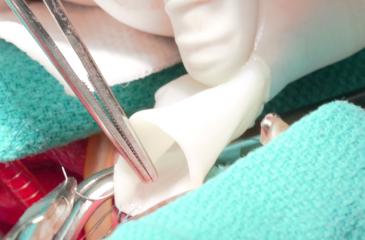University of Minnesota biomedical engineers showed artificial blood vessels implanted in young lambs could grow within the new owner, potentially preventing the need for repeated surgeries in children with congenital heart defects. The breakthrough was recently published by Nature Communications and featured in The Guardian and Star Tribune.
Study leader Robert Tranquillo, PhD, Professor and Head of the University’s Department of Biomedical Engineering, received funding through the Pediatric Device Development Award Program. The program from CTSI and the Pediatric Device Innovation Consortium (PDIC) provides funding, guidance, and services that support the development of pediatric medical devices.
“It’s exciting to see one of our grantees make a groundbreaking discovery that has the potential to help kids with heart defects,” says Sandra Wells, PhD, Assistant Director of CTSI’s Office of Discovery and Translation (ODAT). “As a grantee, Dr. Tranquillo received funding, ongoing guidance, and a hand-picked team of experts dedicated to advancing his project -- all important factors in putting promising discoveries on the path toward improved health.”
Dr. Tranquillo explained the breakthrough’s significance in a College of Science & Engineering news release:
The release described how Tranquillo and team addressed the challenge of engineering a vessel that will grow with its new owner:
This short video shows a tissue-engineered vascular graft being cultured in a pulse-stretch bioreactor in a University of Minnesota Department of Biomedical Engineering lab for up to five weeks:
Dr. Tranquillo described the results as “encouraging”, as the study saw increases in the blood vessel graft’s diameter, collagen protein, and the amount of blood that could be pumped through the vessel -- all without adverse effects.
“Dr. Tranquillo’s tissue engineering innovation hit an important milestone, and is moving closer to an ultimate goal of improving quality of life for pediatric patients,” says Gwenyth Fischer, MD, PDIC founder and University pediatric critical care physician. “This exemplifies the kind of progress we aim to see in our grantees, who are advancing technology-driven medical solutions that could one day help kids live healthier lives.”
CTSI is part of the National Institutes of Health (NIH) Clinical and Translational Science Award program. The CTSA program, managed by the National Center for Advancing Translational Sciences (NCATS), includes more than 60 academic medical institutions across the country whose mission is to accelerate discoveries toward better health. CTSI’s Pediatric Device Development Award Program helps serve the broader goal of translating discoveries that lead to improved human health.
